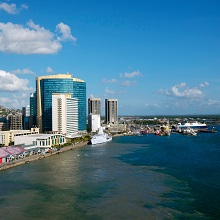The twin island state of Trinidad and Tobago, is a small but high-income country. With a population of 1.3 million people and rich in natural resources, it has one of the highest GNI per capita in Latin America and the Caribbean (US$17,640 in 2015, Atlas method). The economy is largely based on oil and gas production, with the petroleum and petrochemical industries accounting for about 37 percent of GDP and ores and mineral fuels over 70 percent of exports (2015 data). The country has also become a major financial center in the Caribbean.
General elections were held in September 2015 and resulted in a change of Government in favor of the People’s National Movement.
Governance indicators, as measured by Transparency International and the World Bank, have seen a stagnation over recent years. Steps are underway to improve governance and the efficiency of public service delivery.
Economic growth averaged slightly over 8 percent per year between 2000 and 2007, significantly above the average of 3.7 percent for the LAC and Caribbean region during the same period. However, GDP has slowed down since then and after a weak recovery in 2012-13, due to the sharp fall in oil and gas prices. The economy contracted in 2014-15, before a sharper deterioration in 2016 when real GDP growth registered an estimated -2.8 percent. Since the end of the commodities super cycle, the country has faced significant challenges in adjusting to a low energy prices environment. The energy sector was estimated to drop by close to 10 percent in 2016 alone. Consequently, the collapse of energy prices resulted eventually in job losses and had negative effects on tax revenues. On the upside, Trinidad and Tobago can count on a low level of public indebtedness, adequate financial buffers, a solid human capital, and overall political stability, which are expected to facilitate an economic rebound over the medium term.
CHALLENGES AHEAD
The medium-term challenges relate to managing the fall in international energy prices. The country will need to tackle additional measures for much-needed fiscal consolidation, with a view to mitigate the effects of imbalances that have just started to occur. Against this background, one of the risks for the country would be to find itself with a swollen debt at a time when external financial cushions may have been eroded. Policy action will require difficult but necessary steps to rationalize expenditure and maintain adequate levels of revenues. In this context, some of the priorities for country authorities’ include improving the business environment and enhancing public service, and revamping statistical capacity.



